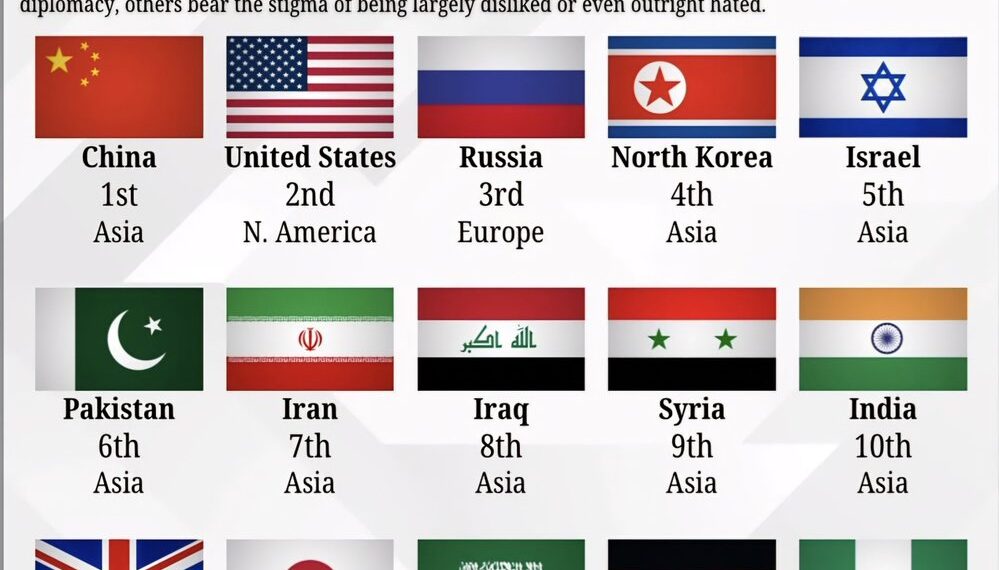Select Language:

The Most Disliked Countries in 2025: An In-Depth Look
In 2025, global sentiment towards various nations continues to fluctuate based on political developments, international relations, and cultural perceptions. Surveys and public opinion polls reveal a list of countries that, for a variety of reasons, face significant dislike on the world stage. Here’s a detailed breakdown of the top 15 most disliked countries this year, shedding light on the complex factors behind these sentiments.
1. China
China remains the most disliked country globally in 2025. Rising tensions over trade disputes, human rights issues, and military activities in the South China Sea contribute to mounting international resentment. Particularly, concerns about censorship and political oppression have shaped negative views among Western nations and neighboring regions alike. Despite China’s economic power and cultural influence, its governance style and foreign policies continue to be major points of contention.
2. United States
The United States continues to evoke mixed feelings worldwide, especially in regions with histories of military intervention or diplomatic disagreements. Its foreign policy decisions, global military presence, and internal social issues often color perceptions negatively, leading many countries to view the U.S. with skepticism or outright dislike. However, American culture and innovation retain their global appeal, even amid these diplomatic strains.
3. Russia
Russia’s ongoing geopolitical conflicts, including its actions in Ukraine and its influence campaigns across other nations, have solidified its position among the most disliked countries. Many nations criticize Russia for actions they perceive as destabilizing or aggressive, leading to widespread distrust and negative sentiments towards the Kremlin’s policies and military activities.
4. North Korea
Persistent isolation, nuclear tension, and human rights concerns keep North Korea high on the dislike list. Its unpredictable leadership and clandestine military programs have alarmed neighboring countries and the international community, fostering a deep-seated suspicion that persists despite international sanctions and diplomatic efforts.
5. Israel
Israel’s complex geopolitical situation in the Middle East continues to generate controversy and resentment. Disputes over territories and differing narratives around conflict zones contribute to its negative perception in parts of the Arab world and among pro-Palestinian groups globally. The ongoing conflict and military actions often draw criticism from international observers.
6. Pakistan
Perspectives on Pakistan are heavily influenced by regional tensions, terrorism concerns, and geopolitical alliances. While Pakistan maintains strategic importance in South Asia, internal political issues and its role in regional conflicts contribute to its unfavorable reputation abroad.
7. Iran
Iran remains a contentious nation due to its nuclear program, regional influence, and support for various groups deemed militant or destabilizing by Western nations. Diplomatic isolation and sanctions further deepen negative perceptions of Iran’s government and foreign policies.
8. Iraq
Iraq’s history of conflict and ongoing security challenges contribute to its disliked status. Political instability, insurgencies, and concerns about governance and corruption keep Iraq in the global unfavorable spotlight, despite efforts toward rebuilding and stabilization.
9. Syria
The ongoing Syrian civil war, humanitarian crises, and allegations of human rights abuses have resulted in widespread international disapproval. The complex web of alliances and conflicts continue to impact Syria’s image globally.
10. India
While India is recognized for its thriving economy and cultural influence, it faces criticism over issues such as religious intolerance, border disputes with neighboring countries, and internal political controversies. These factors shape perceptions that are increasingly negative in some parts of the world.
11. United Kingdom
Post-Brexit geopolitical adjustments, immigration debates, and internal political challenges have impacted the UK’s reputation internationally. Although it remains influential, some perceive it as divided or uncertain about its global role in the coming years.
12. Japan
Although widely admired for its technological advancements and culture, Japan’s historical issues and military policies occasionally draw criticism. Its territorial disputes in East Asia and stance on regional security can also influence public perceptions negatively.
13. Saudi Arabia
Saudi Arabia’s human rights record, involvement in regional conflicts, and socio-political reforms continue to attract criticism. Its vital role in global energy markets and diplomacy complicate its international image, leading some to dislike the nation for various reasons.
14. Germany
Germany’s leadership within the European Union and its handling of immigration and economic policies have led to mixed perceptions. While many admire its stability and influence, others criticize its domestic policies and stance on certain international issues.
15. Nigeria
Nigeria faces significant challenges related to security, governance, and corruption, impacting its reputation abroad. Despite its cultural richness and economic potential, ongoing conflicts, and social issues color perceptions negatively in some regions.
The perceptions of these nations are shaped by a multitude of factors, including geopolitical strategies, historical conflicts, and cultural understandings. While some countries maintain widespread admiration for their advancements and governance, others face mixed or negative sentiments driven by complex global dynamics.
Source: Data Pandas 2025






